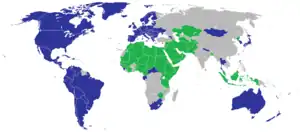
Mapa państw popierających uchwałę ONZ w sprawie orientacji seksualnej i tożsamości płciowej na tle tych, którzy są przeciwni.
SOGI (od ang. Sexual Orientation and Gender Identity[1], czyli orientacje seksualne i tożsamości płciowe) — termin określający ogół zagadnień i problematyki związany z orientacjami seksualnymi i tożsamościami płciowymi[2][3]. Także alternatywny termin, obok LGBT, określający osoby ogół osób nie-heteroseksualnych, nie-heteronormatywnych i nie-cispłciowych oraz interpłciowych. Jest to termin preferowany przez niektóre organizacje ze względu na swoją inkluzywność[4].
Przypisy
- ↑ The Council of Europe, Sexual orientation and gender identity - Homepage [online], coe.int [dostęp 2019-10-31] (ang.).
- ↑ Sean Cahill, Harvey Makadon, Sexual Orientation and Gender Identity Data Collection in Clinical Settings and in Electronic Health Records: A Key to Ending LGBT Health Disparities, „LGBT Health”, 1 (1), 2013, s. 34–41, DOI: 10.1089/lgbt.2013.0001, ISSN 2325-8292 [dostęp 2019-10-31].
- ↑ Sean Cahill i inni, Do Ask, Do Tell: High Levels of Acceptability by Patients of Routine Collection of Sexual Orientation and Gender Identity Data in Four Diverse American Community Health Centers, „PLOS One”, 9 (9), 2014, e107104, DOI: 10.1371/journal.pone.0107104, ISSN 1932-6203, PMID: 25198577, PMCID: PMC4157837 [dostęp 2019-10-31] (ang.).
- ↑ Government Communications and Public Engagement, Sexual Orientation & Gender Identity (SOGI) [online], www2.gov.bc.ca [dostęp 2019-10-31], Cytat: Everyone has a sexual orientation and gender identity (SOGI). It's an inclusive term that applies to everyone, whether they identify as lesbian, gay, bisexual, transgender, queer, two-spirit, heterosexual or cisgender (identifying with the same gender that one was assigned at birth)..
Linki zewnętrzne
- A Summary of BCSTA on SOGI 1 2 3 [online], British Columbia School Trustees Association [dostęp 2019-10-31] (ang.).
- SOGI 1 2 3 [online], SOGI 1 2 3 [dostęp 2019-10-31] (ang.).
This article is issued from Wikipedia. The text is licensed under Creative Commons - Attribution - Sharealike. Additional terms may apply for the media files.